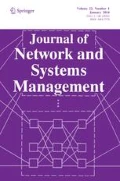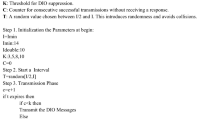Abstract
With the growing interest in converging fixed and mobile networks (FMC), mobile applications will require more and more resources from both the network and the mobile device. In such context, multicasting is essential because it lowers bandwidth consumption by simultaneously reaching a group of multiple recipients. Securing multicast flows has been extensively studied in the past, but none of the existing solutions were meant to handle the constraints imposed by mobile scenarios, in particular the high packet-loss rate. The need for a low overhead self-healing rekeying mechanism that is scalable, reliable and suitable for mobile environments has never been more urgent than with the arrival of FMC in 4G networks. This paper presents two self-healing recovery schemes based on the dual directional hash chains (DDHC) for the logical key hierarchy (LKH) rekeying protocol. This enables a member that has missed up to m consecutive key updates to recover the missing decryption keys without asking the group controller key server (GCKS) for retransmission. Conducted simulations show considerable improvements in the ratio of decrypted messages and in the rekey message overhead in high packet loss environments.







Similar content being viewed by others
References
Cuadra-Sanchez, A., Casas-Caballero, C.: End-to-end quality of service monitoring in convergent iptv platforms. Next Generation Mobile Applications, Services and Technologies, International Conference on 2009; 0, 303–308
Acosta, A.A.R., Garcia-Vázquez, M.S., Colores-Vargas, J.: Mpeg-4 avc/h.264 and vc-1 codecs comparison used in iptv video streaming technology. CERMA ’08: Proceedings of the 2008 Electronics, Robotics and Automotive Mechanics Conference, IEEE Computer Society: Washington, DC, USA, pp. 122–126 (2008)
Weifeng, C., Dondeti, L.R.: Performance comparison of stateful and stateless group rekeying algorithms. Int. J. Comput. Sci. Netw. Secur. (IJCSNS) 8, 186–195 (2008)
Zhu, S., Setia, S., Jajodia, S.: Adding reliable and self-healing key distribution to the subset difference group rekeying method. In: Group Communications and Charges: Technology and Business Models. Proceedings of the 5th COST 264 International Workshop on Networked Group Communications, NGC 2003, pp. 107–118 (2003)
Zhu, S., Jajodia, S.: Scalable group rekeying for secure multicast: a survey. pp. 1–10 (2003)
Ioannidis, J., Keromytis, A.D., Yung, M. (eds.): Applied Cryptography and Network Security, Third International Conference, ACNS 2005, New York, NY, USA, June 7–10, 2005, Proceedings, Lecture Notes in Computer Science, Vol. 3531, (2005)
Chen, W., Dondeti, L.: Recommendations in using group key management algorithms. DARPA Information Survivability Conference and Exposition, 2003. Proceedings, Vol. 2, pp. 222–227 (2003)
Sherman, A.T., McGrew, D.A.: Key establishment in large dynamic groups using one-way function trees. IEEE Trans. Softw. Eng. 29(5), 444–458
Perrig, A., Song, D., Tygar, J. Elk: a new protocol for efficient large-group key distribution. pp. 247–262 (2001)
Raj, S.B.E., Lalith, J.J.: A novel approach for computation-efficient rekeying for multicast key distribution. Int. J. Comput. Sci. Netw. Secur. (IJCSNS) 9, 279–284 (2009)
Wallner, D., Harder, E., Agee, R.: Key management for multicast: Issues and architectures. RFC 2627, Internet Engineering Task Force 1999. http://www.faqs.org/rfcs/rfc2627.html
Wong, C.K., Gouda, M., Lam, S.S.: Secure group communications using key graphs. IEEE/ACM Trans. Netw. 8(1), 16–30
Cho, T., Lee, S.H., Kim, W.: A group key recovery mechanism based on logical key hierarchy. J. Comput. Secur. 12(5), 711–736 (2004)
Zhang, X., Lam, S., Lee, D.Y., Yang, Y.: Protocol design for scalable and reliable group rekeying. IEEE/ACM Trans. Netw. 11(6), 908–922 (2003)
Setia, S., Zhu, S., Jajodia, S.: A comparative performance analysis of reliable group rekey transport protocols for secure multicast. pp. 21–41 (2002)
Staddon, J., Miner, S., Franklin, M., Balfanz, D., Malkin, M., Dean, D.: Self-healing key distribution with revocation. pp. 241–257 (2002)
Blundo, C., D’Arco, P., De Santis, A., Stinson, D.: On unconditionally secure distributed oblivious transfer. J. Cryptol. 20(3), 323–373 (2007)
Liu, D., Ning, P., Sun, K.: Efficient self-healing group key distribution with revocation capability. Proceedings of the 10th ACM Conference on Computer and Communications Security (CCS ’03), (2003)
Hong, D., Kang, J.S.: An efficient key distribution scheme with self-healing property. Commun. Lett. IEEE 9(8), 759–761 (2005)
More, S.M., Malkin, M., Staddon, J., Balfanz, D.: Sliding-window self-healing key distribution. SSRS ’03: Proceedings of the 2003 ACM workshop on Survivable and self-regenerative systems, pp. 82–90 (2003)
Padro, C., Sáez, G., Villar, J.L.: Detection of cheaters in vector space secret sharing schemes. Des. Codes Cryptogr. 16(1):75–85 (1999)
Tian, B., Han, S., Dillon, T.S., Das, S.: A self-healing key distribution scheme based on vector space secret sharing and one way hash chains (2008)
Dutta, R., Wu, Y.D., Mukhopadhyay, S.: Constant storage self-healing key distribution with revocation in wireless sensor network. pp. 1323–1328 (2008)
Dutta, R., Chang, E.C., Mukhopadhyay, S.: Efficient self-healing key distribution with revocation for wireless sensor networks using one way key chains. pp. 385–400 (2007)
Kausar, F., Hussain, S., Park, J.H., Masood, A.: Secure group communication with self-healing and rekeying in wireless sensor networks. pp. 737–748 (2007)
Shi, M., Shen, X., Jiang, Y., Lin, C.: Self-healing group-wise key distribution schemes with time-limited node revocation for wireless sensor networks. IEEE Wireless Communications 14(5), 38–46 (2007)
Author information
Authors and Affiliations
Corresponding author
Rights and permissions
About this article
Cite this article
Rossi, A., Pierre, S. & Krishnan, S. An Efficient and Secure Self-Healing Scheme for LKH. J Netw Syst Manage 18, 327–347 (2010). https://doi.org/10.1007/s10922-010-9166-9
Published:
Issue Date:
DOI: https://doi.org/10.1007/s10922-010-9166-9




